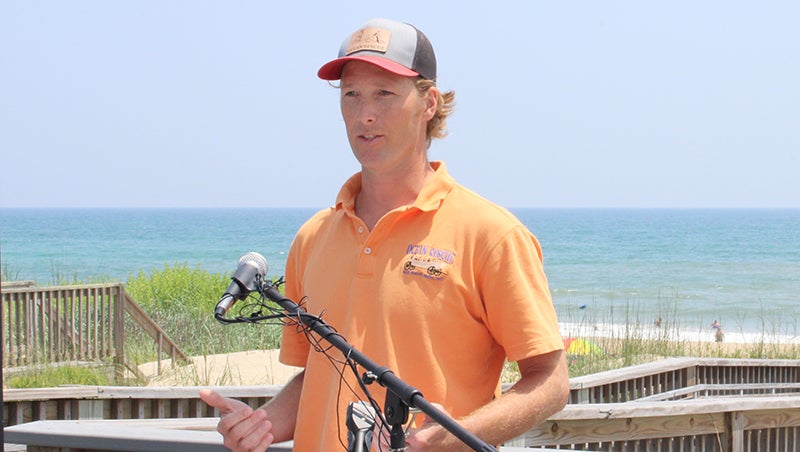New tips and resources for beach safety
Published 2:39 pm Sunday, July 9, 2023
|
Getting your Trinity Audio player ready...
|
“Our goal is to make sure you enjoy the sun, sand, and surf and go home safely,” said Kill Devil Hills public information officer Rachel Tackett in a press conference Thursday, June 29, 2023 to increase beach safety awareness.
Representatives from the National Weather Service, Dare County Emergency Management department and Ocean Rescue supervisors from Duck to Ocracoke spoke to the media to get the word out about hazards like rip currents, heat exhaustion and unattended holes.
The experts encouraged beach goers to sign up for daily beach condition updates by texting “OBXBeachConditions” to 77295 for an alert at 8:30 each morning.
The website LoveTheBeachRespectTheOcean.com is a great resource for daily weather conditions, rip current risks and water temperatures. The “Find a Lifeguard” tab lists all the OBX locations where a lifeguard is posted.
Drew Pearson, Dare County Emergency Services director, said finding a lifeguarded beach is one of the best ways to stay safe at the water.
“Our efforts are focused on getting information to beachgoers before they go over the dunes,” he said. And when they do arrive on shore, “Stop and talk to those lifeguards.”
The northern beaches are well equipped with lifeguard stations, but there are only five posted lifeguard beaches on Hatteras Island: Rodanthe, Buxton, Frisco, Coquina and Ocracoke. Though lifeguards patrol miles of beaches, visitors are encouraged to find a beach with a lifeguard stand close by.
Erik Heden, warning coordination meteorologist with the National Weather Service, talked about the dangers of rip currents. A rip current is a strong channel of water flowing from the beach out into ocean.
“Rip currents are extremely fast, faster than an Olympic swimmer,” Heden said.
“Red flags mean a high rip current threat,” added KDH lifeguard Steven Gray. Rip currents can be identified by a narrow channel of water moving at about 8 feet per second. The water may be choppy, there may be a line of foam, or a break in the wave pattern.
If caught in a rip current, Gray said, it’s important to stay calm and float to conserve energy, then swim parallel to the shoreline in either direction to escape the current before attempting to return to the shore.
“If you don’t have enough energy to swim, draw attention to yourself and get help,” Gray said. But most importantly, “If red flags are flying, don’t risk your life or the lives of others.”
For rip currents, low risk does not mean no risk.
Ben Battaile, assistant Ocean Rescue supervisor for KDH, talked about sunny day hazards like heat exhaustion and hot winds, making sure you have a plan for staying hydrated, finding shade and taking breaks. Getting onto the beach with umbrellas and bags and gear is easy in the morning, but most instances of heat exhaustion happen at the end of the day when people are packing up and getting off the beach. Battaile said to reach out to lifeguards for help.
“Lean on us to help you do that,” he said.
Chad Motz, Nags Head Ocean Rescue captain, said to plan ahead for family safety by assigning one person in your group to be the “water watcher” or lifeguard.
“Someone who is free of distractions – not reading a book, and not on a phone,” he said. When on the beach, watch for the sneaker waves that come up unexpectedly and can easily sweep a toddler or young child off their feet.
“Play safely, keep an eye out, have a plan, and know what to do,” Motz said. “And never turn your back on the water.”
If you do have an emergency, Dare County Sherriff’s Office Captain Jack Scarborough said it’s critical to know your location when making a 911 call.
“Do you know what ramp number you took? Did you turn left or right? What beach access are you at?” Scarborough said.
“The more information the operator gets, the more information the responder gets,” he continued. Scarborough said you are not delaying help by answering all of the operator’s questions, and help is dispatched usually after the first question is answered.
As important as it is to be prepared and informed, KDH Ocean Rescue supervisor David Elder reminded all beach goers to stay alert at all times: “The ocean is inherently unsafe. It’s never a safe day on the beach.”
SUBSCRIBE TO THE COASTLAND TIMES TODAY!







